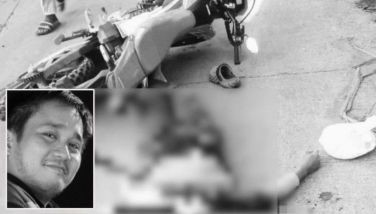For Borrowing Cars From Dealer: LTO exec gets 336 years in jail
May 22, 2002 | 12:00am
Timoteo Garcia, regional director of the Land Transportation Office (LTO) in Cagayan de Oro City, loved to visit his farm on weekends. No problem with that. The trouble is he would often visit his farm using utility vehicles he borrowed from a local car dealer. Now that got him into trouble with the law.
The Sandiganbayan’s first division sentenced Garcia yesterday to a minimum of 336 years in jail on 56 counts of graft, representing the number of times he was found to have used a vehicle from the Oro Asian Automotive Corp. from January 1993 to November 1994.
He was found to have violated Section 3, Paragraph b of Republic Act 3019, or the Anti-Graft and Corrupt Practices Act, which prohibits government officials from directly or indirectly requesting or receiving gifts or favors for his own benefit from any person who transacts with the government.
All because his driver, Gilbert Nabo, whom the LTO assigned to him, had been a little careless. One day, Nabo, while driving a borrowed vehicle, ran over a child.
The child died and the victim’s mother, Ma. Lourdes Miranda, dug up the records and discovered that the vehicle belonged to Oro Asian Automative Corp., which assembled and marketed Asian utility vehicles (AUVs). The driver has since gone into hiding.
Miranda subsequently filed a graft case against Garcia, Nabo and another LTO employee, Nery Tagupa, who was acquitted for lack of evidence.
During the trial, Estanislao Yungao, liaison officer of Oro Asian Automotive Corp., testified that Garcia often borrowed a vehicle from his company on a Friday by either calling him up or the general manager, Aurora Chiong.
Yungao said it was his duty to report to the LTO the engine and chassis numbers of vehicles which his company would assemble.
Once the AUVs were assembled, he would also request the LTO for conduct permits so that the vehicles could undergo road tests, after which he would return to the LTO to have the vehicles registered before they were sold in the market.
He said he kept the delivery receipts of all the vehicles released to Garcia for his weekend trips to his farm, the location of which court records failed to pinpoint.
The Sandiganbayan’s first division listed in its 24-page decision the 56 occasions when a vehicle — a Fiera AUV, a Tamaraw or an Aero — was delivered to Garcia for his personal use.
The favors worked. Yungao said Garcia almost always granted his company’s requests for registration-related transactions, except for one instance when the LTO regional director refused to extend a five-day road test.
Prosecutors also presented Chiong as witness. The general manager said she felt irritated whenever Garcia requested for a vehicle he could use to visit his farm.
Under the circumstances, however, she said she could not refuse Garcia’s requests. Besides, she told the court, she considered it an act of "public relations."
Garcia denied ever borrowing a vehicle from the car dealer, pinning all the blame on Nabo who, he said, used his name for his (Nabo’s) personal gain.
However, the three justices of the Sandiganbayan’s first division — Gregory Ong, who penned the decision; Francis Garchitorena, the presiding judge; and Catalino Castañeda — did not buy Garcia’s explanation.
The special anti-graft court sentenced him to an indeterminate jail sentence of six years and one month to 12 years and one month for each of the 56 counts of graft.
The Sandiganbayan’s first division sentenced Garcia yesterday to a minimum of 336 years in jail on 56 counts of graft, representing the number of times he was found to have used a vehicle from the Oro Asian Automotive Corp. from January 1993 to November 1994.
He was found to have violated Section 3, Paragraph b of Republic Act 3019, or the Anti-Graft and Corrupt Practices Act, which prohibits government officials from directly or indirectly requesting or receiving gifts or favors for his own benefit from any person who transacts with the government.
All because his driver, Gilbert Nabo, whom the LTO assigned to him, had been a little careless. One day, Nabo, while driving a borrowed vehicle, ran over a child.
The child died and the victim’s mother, Ma. Lourdes Miranda, dug up the records and discovered that the vehicle belonged to Oro Asian Automative Corp., which assembled and marketed Asian utility vehicles (AUVs). The driver has since gone into hiding.
Miranda subsequently filed a graft case against Garcia, Nabo and another LTO employee, Nery Tagupa, who was acquitted for lack of evidence.
During the trial, Estanislao Yungao, liaison officer of Oro Asian Automotive Corp., testified that Garcia often borrowed a vehicle from his company on a Friday by either calling him up or the general manager, Aurora Chiong.
Yungao said it was his duty to report to the LTO the engine and chassis numbers of vehicles which his company would assemble.
Once the AUVs were assembled, he would also request the LTO for conduct permits so that the vehicles could undergo road tests, after which he would return to the LTO to have the vehicles registered before they were sold in the market.
He said he kept the delivery receipts of all the vehicles released to Garcia for his weekend trips to his farm, the location of which court records failed to pinpoint.
The Sandiganbayan’s first division listed in its 24-page decision the 56 occasions when a vehicle — a Fiera AUV, a Tamaraw or an Aero — was delivered to Garcia for his personal use.
The favors worked. Yungao said Garcia almost always granted his company’s requests for registration-related transactions, except for one instance when the LTO regional director refused to extend a five-day road test.
Prosecutors also presented Chiong as witness. The general manager said she felt irritated whenever Garcia requested for a vehicle he could use to visit his farm.
Under the circumstances, however, she said she could not refuse Garcia’s requests. Besides, she told the court, she considered it an act of "public relations."
Garcia denied ever borrowing a vehicle from the car dealer, pinning all the blame on Nabo who, he said, used his name for his (Nabo’s) personal gain.
However, the three justices of the Sandiganbayan’s first division — Gregory Ong, who penned the decision; Francis Garchitorena, the presiding judge; and Catalino Castañeda — did not buy Garcia’s explanation.
The special anti-graft court sentenced him to an indeterminate jail sentence of six years and one month to 12 years and one month for each of the 56 counts of graft.
BrandSpace Articles
<
>
- Latest
- Trending
Trending
Latest
Trending
Latest
Recommended































